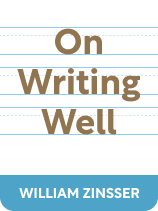

This article is an excerpt from the Shortform book guide to "On Writing Well" by William Zinsser. Shortform has the world's best summaries and analyses of books you should be reading.
Like this article? Sign up for a free trial here .
What exactly is cluttered writing? How does unnecessary wordiness compromise your writing?
In his book On Writing Well, William Zinsser points out five common types of clutter: wordy phrases, euphemisms, adverbs, too many adjectives, and qualifiers. By reducing or eliminating these types of clutter in your writing, you will write more clearly and communicate your point more effectively.
Let’s look at a few common types of cluttered writing and how to avoid them.
Eliminate Clutter
In his book On Writing Well, William Zinsser asserts that simple writing can’t have clutter. Clutter is a word or phrase that doesn’t add meaning to your sentence, thus needlessly increasing the number of words in your sentence. Zinsser believes that it’s your job as a writer to carefully select the right words and delete clutter—this is part of what makes writing a craft.
Zinsser explains that by adding redundant words to your sentences, clutter forces the reader to do unnecessary work to understand your meaning. She might not have the patience to read a page of information that could be condensed to a paragraph. She’ll lose interest and stop reading.
If you think a word or phrase is clutter, Zinsser suggests bracketing it, rather than marking it out. Then you can analyze the sentence with and without the bracketed section. Decide if it adds anything to the sentence—if not, it’s clutter and should be deleted. Bracketing will train you to look for clutter and to make conscious decisions about what to include in your writing.
For example, imagine a memo that reads, “We’re in the process of renovating our offices.” This sentence could be revised to, “We’re renovating our offices.” Readers understand that renovations are a process, so “in the process of” is clutter and can be omitted without losing information.
| Clutter and Cutting the Fat Another way to think of clutter is to consider your writing like a nutritious meal. Eliminating clutter is “cutting the fat” of writing—anything that’s unnecessary and doesn’t add value to the “meat” or substance of what you’re saying. Then add descriptions to your writing—this is like the fruits, vegetables, and sauces that add color and flavor to your meal. The key is to create a balanced meal by eliminating unhealthy fat. If you’re struggling to cut the fat (and bracketing doesn’t work), try using an online editor like the Hemingway App. This tool highlights hard-to-read sentences, adverbs, passive voice, and other ways your writing may sound confusing. Like Zinsser’s bracketing technique, this lets you evaluate your writing and make thoughtful changes. But be careful not to rely exclusively on these kinds of tools—they shouldn’t be a crutch. Rather, they should help you develop a keener eye for words that aren’t doing necessary work. |
Let’s look at a few common types of cluttered writing. If you come across them in your writing, bracket them.
1. Wordy Phrases
Zinsser argues that wordy phrases can be a source of clutter if those phrases take the place of single words that have the same meaning. For example, “in the event that” or “for the purpose of” are both common phrases that create clutter. In this case, you can reduce these phrases to “if” and “for” since these words concisely convey the idea of the phrases.
To eliminate cluttered writing, choose the word instead of the phrase. The word is usually better at conveying the meaning anyway—it has a purpose and a place in our language for a reason. For example, “During the course of the investigation, prosecutors found evidence.” “During” means “throughout the course or duration of.” To say “during the course of” is redundant, and could be simplified to, “During the investigation, prosecutors found evidence.”
| Don’t Clear Your Throat on Paper Some experts refer to these wordy phrases as a form of “throat-clearing,” or a preamble to your writing. Throat-clearing prepares the reader for what they’re about to read rather than getting to the point of the sentence or story. This habit is the written equivalent of “like,” “um,” and “uh” for public speakers—it’s filler. It often has the effect of making a writer sound insecure or unsure of what she’s writing. Experts note that these “throat-clearing” phrases can be omitted without losing any meaning: -It is important to note that… -I further point out that… -An important aspect, which must not be overlooked, is that… -It would appear to be the case that… -It should be emphasized that… Use these phrases to pinpoint ideas in your writing that need to be emphasized or developed. Then expand on those ideas, and delete those phrases from your draft. |
2. Euphemisms
To achieve simplicity, Zinsser also recommends avoiding euphemisms: words or phrases that indirectly talk about a taboo or embarrassing topic. Euphemisms complicate your writing because readers must interpret your true meaning. For example, “it left a lot to be desired” is an indirect and more complex way of saying, “it was bad.”
| The Cultural Context of Euphemisms In addition to being a source of clutter, other experts believe that euphemisms are culturally dependent phrases and therefore may not be understood by people outside your culture. Misunderstandings can arise because euphemisms can be shaped by truths unique to particular nationalities, so the full connotation of a phrase may not be readily apparent. -For example, American euphemisms obscure words that aren’t offensive to begin with. For example, “in the family way” replaces “pregnant,” and “previously owned” replaces “used.” Some researchers believe this reflects the American pursuit of perfection. -In contrast, euphemisms in China reflect a value of respect and politeness. For example, rather than directly turn down an invitation, someone might say that something is “not convenient,” which people understand to mean “no.” While euphemisms serve a purpose in verbal communication, not everyone will understand the cultural context behind these phrases. Therefore, reconsider using euphemisms in your writing. |
3. Adverbs
Zinsser contends that adverbs are one of the most common sources of clutter for writers, and they signal areas where you can condense two or more words into one. Adverbs modify verbs, explaining how someone does something. They often end in “-ly.” For example, “loudly,” “quietly,” and “slowly” are all adverbs that describe how someone might perform an action.
Adverbs are clutter because a verb already implies how someone is performing that action. For example, writing “ran quickly” is redundant since “run” already implies quickness. So including “quickly” doesn’t add anything to the reader’s understanding. If a verb doesn’t convey the meaning of the adverb, find a more specific verb.
Zinsser recommends that when you find yourself using many adverbs, go back and bracket them with the verb they modify. Decide if your verb already conveys the meaning of the adverb. If it does, delete the adverb. If it doesn’t, consult your dictionary or thesaurus to find one word that captures the meaning of the two words you bracketed.
For example, “while the dog slept peacefully in the corner, a mouse quickly ran away from the cat.” Bracket the adverbs with the verbs they modify: “While the dog [slept peacefully] in the corner, a mouse [quickly ran] away from the cat.” What word could replace “slept peacefully”? Consider slumbered, dozed, or napped. What word could replace “quickly ran”? Consider scurried, dashed, or darted.
| How to Avoid Adverbs: Describe Context, Not Action Like Zinsser, Stephen King also advises against using adverbs, particularly in dialogue. Weak writers use adverbs in dialogue to break up the monotony, as in “‘Put down the gun,’ Sean pleaded tentatively.” King recommends deleting the adverb and defaulting to the simple “he said, she said” dialogue construction. Then, instead of describing how he said something, describe the context of the situation. For example, you might explain that Sean felt his heart rate quicken or noticed his breath becoming shallow. If you describe a timid character in a frightening situation (such as having a gun pointed at him), the reader will make the connection that he was tentative or scared when he said, “Put down the gun.” Thus the context will provide more information than overexplaining how an action was performed. |
4. Adjectives
Zinsser cautions against using too many adjectives because they can be redundant, thus creating cluttered writing. Adjectives describe nouns and provide detail. But some nouns already convey the idea of the adjective. For example, writing “the green grass” is redundant because grass is naturally green. But if the grass was “brown” or “dying,” including those adjectives adds detail your reader didn’t already know.
Zinsser believes you should use adjectives sparingly. Then when you do use an adjective, it’ll be more impactful because it’ll add detail that the reader couldn’t have inferred from the noun or verb.
| Interpretive vs. Descriptive Adjectives Since Zinsser advises against using many adjectives, how do you provide detail in your writing? Other writers argue that the type of adjective you use matters. They recommend that you avoid interpretive adjectives, or adjectives that are imprecise because they are up to the reader’s interpretation. For example, “the impressive building” doesn’t provide much detail. “Impressive” is up to the reader’s interpretation—what kind of building does she think is impressive? Two impressive buildings might not look anything alike. Instead of interpretive adjectives, opt for descriptive adjectives. These are adjectives that are less likely to be misinterpreted because they reflect an objective truth or observation. For example, saying “the ornate Victorian manor” or “the contemporary white house” is more descriptive than “impressive building.” |
5. Qualifiers
Another way to simplify your writing is to avoid qualifiers, or words that modify the meaning of other words (particularly nouns) rather than adding meaning of their own. For example, “really,” “probably,” “I think,” and “very” are all qualifiers.
To simplify your writing, Zinsser recommends finding one word that encapsulates the meaning behind your modifier and the word it’s modifying. For example, instead of writing “fairly cold,” consider “cool.” You’ll use fewer words while also providing a more accurate description, thus achieving simpler writing.
| Identify Your Crutch Words For many writers, qualifiers fall under the category of “crutch words.” These are the words that each writer personally falls back on and uses too often. One expert recommends always deleting “very,” “quite,” and “really” since they make your writing sound weaker. She also suggests creating a list of your personal crutch words. To do this, read through your writing and find your most overused words and phrases. You can also use a text reading software to read your work to you. Often, hearing your work can highlight your crutch words. Once you’ve identified your common crutch words, refer to this list when editing your drafts. If you’re using a computer, try using a Find or text search tool to search for each word or phrase. Then eliminate your crutch words or find synonyms to replace them with a more precise word. |

———End of Preview———
Like what you just read? Read the rest of the world's best book summary and analysis of William Zinsser's "On Writing Well" at Shortform .
Here's what you'll find in our full On Writing Well summary :
- A back-to-basics approach to the craft of writing
- How to practice simple, clear, and engaging writing—even if you're not a writer
- How to effectively put your ideas into words






